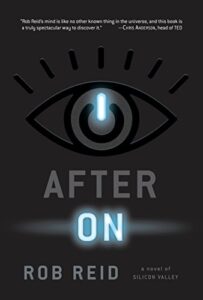The technological point when a general artificial intelligence becomes more powerful than and uncontrollable by humans. The AI does it by continuously improving itself in faster and faster cycles.
When you read as much science fiction as I do, you run into a lot of books about The Singularity. The reason is obvious. How will runaway artificial intelligence treat humans. Will it serve us benevolently and improve our lives? Or will it see us as resources that need to be optimized, bags of water and organic matter that it can use to meet its objective? Furthermore, is its emergence as inevitable as some make it out to be?
Author Rob Reid explores the topic in his book After On.
After On is split into two parts. During the first part, Reid develops the characters, their background, and their motivations. He uses the city of San Francisco as his primary setting. Anyone who has spent significant time in the city will recognize the landmarks. For example, he uses Bourbon & Branch, a bar modeled after a Prohibition-era speak-easy, as the backdrop for a couple of defining scenes.
In the second part of the book, the AI takes center stage. How it develops, the actions it takes, and the efforts of its human owners to control it drive the story.
Overall, I liked Reid’s writing style. The writing is witty and humorous. It takes a satirical look at Silicon Valley culture, poking fun at everything from the excesses, sense of entitlement, bro-centric culture, and even the free snacks and meals provided in company cafeterias. If you’ve worked anywhere near, in, or around the technology sector, you’ll relate. Some lampooning my even hit a little too close to home.
I also found his take on a general purpose, super intelligent AI to be refreshing. Not to give too much away, but most books about The Singularity focus on a dystopian outcome where man is pitted against machine in an all out war. Reid’s take focuses more on how humans would co-exist with an AI that sees humans as benign, to the point of treating its creators like family.
On the downside, I found the book to be a long, laborious read. Reid spends a lot of time on set up, too much time in my opinion. The actions scenes were also long and drawn out, which did not help to improve the pace of the book. Basically, I’ve found that the books I really like are hard to put down, which wasn’t the case with After On.
While the book is well written and well researched, I’d recommend other books ahead of After On if The Singularity is a topic that interests you (see my Must Reads and Fun Reads for ideas). You’ll find them just an informative, just as entertaining, and likely a bit more engaging.

